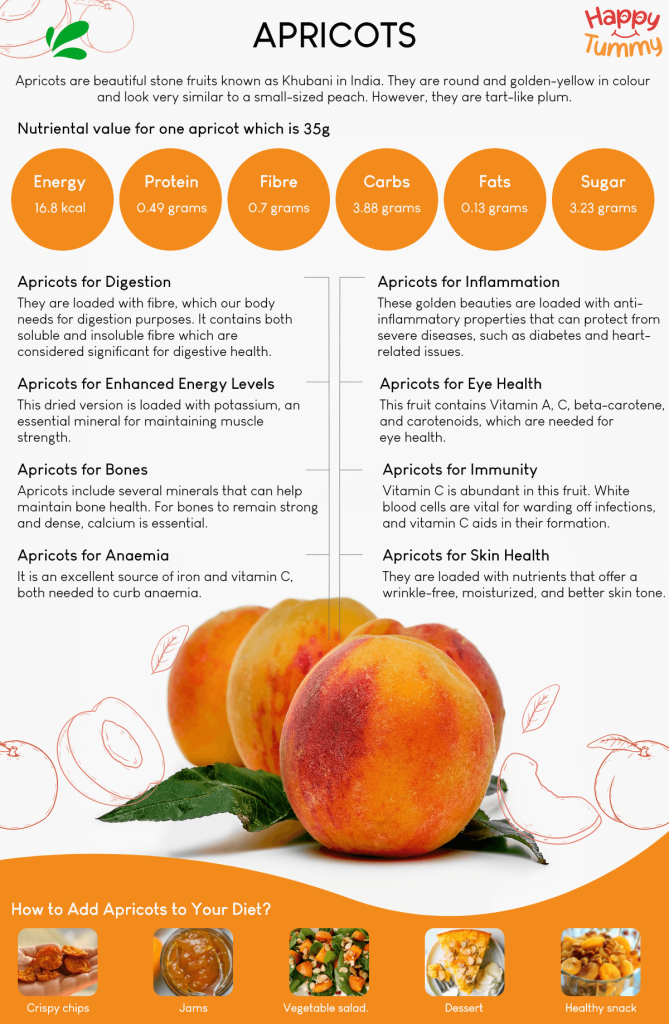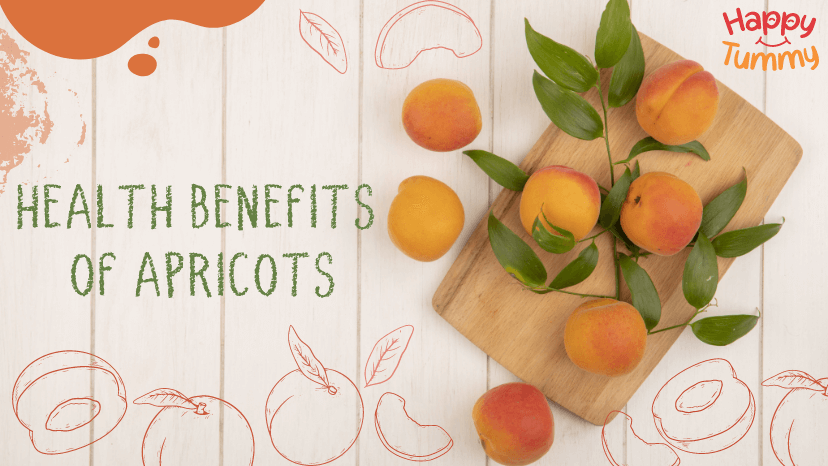Table of Contents
In our Indian culture, if there is one thing that is emphasized constantly, it is how important it is to include fruits as a part of our daily balanced diet. Fruits are delicious, sweet, sometimes sour, and contain vital nutrients such as vitamins & minerals.
Often, you must have heard of eating apples, oranges, kiwis, etc., for numerous reasons. Do you realize there are more fruits than just these common ones?
Apricots are one such fruit that not many people discuss for their health benefits. However, it is a natural goodness that can offer you tons of health benefits.
They are flavourful, colourful, and packed with nutrients supporting overall health and wellness. So, let’s begin this sweet, sour, and tangy journey and learn some exciting facts about Apricots.
What are Apricots?
Apricots are beautiful stone fruits known as Khubani in India. They are round and golden-yellow in colour and look very similar to a small-sized peach. However, they are tart-like plum.
These fruits are delicious, giving a sweet and sour aftertaste. You can include them in various ways in your diet by eating them raw or making delicious recipes out of them.
What’s more important to know is the various health advantages they offer. Both the fresh and dried versions are considered significant for health. Let’s find out more about them.
Nutritional Profile of Apricots
Below is the nutritional profile of apricots and the nutrients you can get when you eat one piece weighing almost 35 grams [1]:
| Nutrients | Amount |
| Energy | 16.8 kcal |
| Protein | 0.49 grams |
| Fibre | 0.7 grams |
| Carbohydrates | 3.88 grams |
| Fat | 0.13 grams |
| Sugar | 3.23 grams |
Health Benefits of Apricots

Apricots are considered a superfood, especially the dried version. This fruit has many antioxidants, minerals, and vitamins that are excellent for our bodies. Let’s look at the different health advantages they offer us:
#1 Apricots for Digestion
One of the most common issues these days is digestion due to our lifestyle and unhealthy eating habits. If you also face this issue, it is time to include this excellent fruit in your diet.
They are loaded with fibre, which our body needs for digestion purposes. It contains both soluble and insoluble fibre which are considered significant for digestive health and make our tummy a happy tummy [2].
They are also great for resolving constipation problems by adding bulk to the stool and improving bowel movement because of their laxative properties. Thus improving gut health and keeping your tummy happy.
If you want to know the fibre content of this fruit, you can check it out on My Meal Plan by Aashirvaad Atta. You can find the fibre content of apricots and any other food product you choose.
Additionally, take the Digestive Quotient Test to understand your digestive health by answering simple questions. You will know everything about your digestive health in less than a few minutes.
#2 Apricots for Eye Health
Another reason to include this nutritious fruit in your diet is to keep your eyes healthy. This fruit contains Vitamin A, C, beta-carotene, and carotenoids, which are needed for eye health.
These essential vitamins and minerals can support overall eye health and may reduce the chances of vision problems. So, if you want to improve your vision and not depend on glasses, it is time to try this delicious fruit [3].
#3 Apricots for Enhanced Energy Levels
People going to the gym will understand how important it is to have the proper energy levels. Hence, you need a diet rich in energy-giving food products and dried apricots on that list.
This dried version is loaded with potassium, an essential mineral for maintaining muscle strength. Eating them before hitting the gym can give you the right amount of energy you need for your workouts.
Thus, they make a perfect pre-workout snack or food to include in your gym bag [4].
#4 Apricots for Skin Health
No wonder this fruit is gaining popularity, as it can do wonders for your skin. They are loaded with nutrients that offer a wrinkle-free, moisturized, and better skin tone.
It contains many antioxidants that protect the skin from free radicals and offer young and glowing skin. Moreover, it has a good water content, which keeps the skin hydrated and prevents dryness and flakiness.
Their natural acids have the potential to function as a mild exfoliator, eliminating dead skin cells and encouraging a more even-toned complexion [5].
Do you know you can make a face pack with apricots for healthy and good-looking skin? Follow the simple steps below:
- De-seed an apricot and make a puree of it.
- In the puree, add 1 tsp. of apricot kernel powder.
- Apply this paste on your face and neck and leave it for 10 minutes.
- Rinse it with warm water; use it twice a week for better results.
1. Apricots for Anaemia
People who are anaemic and have less iron should definitely include this versatile fruit in their diet. It is an excellent source of iron and vitamin C, both needed to curb anaemia.
Vitamin C in the fruit helps enhance the absorption of non-heme iron, which is essential for increasing haemoglobin. Therefore, people with less HB should eat Vitamin C-rich and iron-rich foods for better results [6].
2. Apricots for Bones
Apricots include several minerals that can help maintain bone health. Compared to dairy products, they do not contain an extremely high amount of calcium, although they contain some. For bones to remain strong and dense, calcium is essential.
Vitamin K, which is abundant, is essential for bone metabolism. Creating proteins that control bone mineralization and maintain bone health involves vitamin K.
Phosphorus is another essential mineral for healthy bones found in these fruits. Together with calcium, phosphorus helps to create and preserve bone structure.
Magnesium, also found in these, helps maintain healthy bones by facilitating calcium absorption and encouraging the transformation of vitamin D into its active form, which is necessary for calcium absorption [7].
3. Helps in Managing Inflammation
Inflammation is not always a bad thing. It is a normal body immune response to fight infections and foreign elements and protect our bodies from diseases and injuries.
However, chronic inflammation can be harmful. It can lead to many severe diseases, such as diabetes and heart-related issues. These golden beauties are loaded with anti-inflammatory properties that can protect from such diseases.
This fruit’s seed is considered to be healthier. The oil from this seed is said to have many anti-inflammatory properties [8].
4. Apricots Boost Immunity
A potent antioxidant with immune-boosting qualities, vitamin C is abundant in this fruit. White blood cells are vital for warding off infections, and vitamin C aids in their formation.
Antioxidants found in apricots include lutein, zeaxanthin, and beta-carotene. By lowering oxidative stress and inflammation and counteracting free radicals in the body, these antioxidants generally support immune system health.
Moreover, minerals like potassium and copper, which are beneficial to general health and may influence immunological function, are abundant in this fruit [9].
5. Manages Stimulation and Oxidative Stress
The essential oils of apricot have some expectorant and stimulating properties. Reducing pressure and stress on the lungs and respiratory system can help avoid bronchitis, TB, and asthma episodes.
Moreover, antioxidants present in them can help reduce inflammation and oxidative stress, which are common reasons for asthma episodes. Also, vitamin A, found in this fruit, is necessary to keep the mucous membranes in the respiratory system in good condition and lessen respiratory symptoms [10].
Risks Associated with Apricots
When consuming this fantastic fruit, remember not to eat its seed, often known as kernels. It is said that the oil from this seed is beneficial. However, the seed itself can be cyanide poisoning.
It would help if you were careful with the raw, unprocessed and even the powder form of these kernels. Eating them can lead to severe health situations.
How to Add Apricots to Your Diet?
These little yellow-golden fruits are marvels of healthy nutrients; you should not wait to try their goodness. You can easily incorporate this healthy and delicious fruit into your diet in many ways. Let’s look at some of them:
- You can slice and bake this fruit to make crispy chips for evening munching.
- Poach these beautiful fruits with vanilla beams and eat them as a dessert.
- Bake them as tart and include more dry fruits to make it a healthy snack.
- Use apricots for making jams and then spreading them over bread or chapatti.
- You can even use the jam to eat with French toast.
- You can use fresh apricots to make a chicken or vegetable salad.
Bottom Line
In conclusion, there are numerous health advantages to the golden jewels known as apricots. They are rich in antioxidants, fibre, vitamin C, and other vital components that support general health.
This adaptable fruit is a helpful addition to a balanced and healthy diet, supporting immunological function, encouraging skin health, assisting in bone building, and relieving illnesses like asthma.
Therefore, accept the natural goodness of apricots and enjoy their delightful flavour and their many health and energy-boosting properties. Include them in any way you like and give this nutritious fruit to everyone in your family.
FAQs
Dried apricots offer numerous health advantages. However, they should be eaten in moderation. You should consume no more than 3 or 4 pieces per day of the dried version for good results.
They are rich in iron, and an adequate supply of iron is essential for the body to produce haemoglobin. They also enhance blood circulation and protect against anaemia.
Yes, dried ones can be eaten at night as they are not high in sugar. Also, they can promote a healthy sleep routine.
Yes, this fruit has many minerals and vitamins, which greatly benefit the skin. They may help in enhancing the skin texture, moisturize, and remove wrinkles.
Fresh apricots have a medium glycemic index, which is 57. it should be consumed in moderation if an individual is diabetic or is in the pre-diabetic stage















